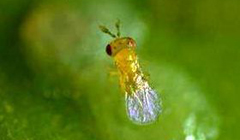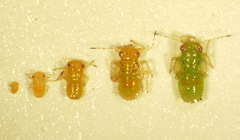|
Ecology of Natural Enemies
Parasitoids and predators are ideal model organisms for the study of behavioral ecology. The lifetime reproductive success of a female natural enemy is dependent on her ability to locate hosts, to assess the quality of each host, and to respond to variation in encounter rates and host quality. Recent projects focus on:
- Influence of temperature on life table parameters of Galendromus occidentalis, a key predator of spider mites, and Aphidius transcaspicus, a parasitoid of mealy plum aphid
- A comparison of population growth rates of a broom psyllid (Arytinnis hakani) on plants from a series of native and invasive populations of French broom
- Quantifying predation by comparing population growth rates of aphids to consumption capacity of predators
- Plant effects on the quality of Epiphyas postvittana as an invasive host for resident parasitoids in California
 |
Trichogramma platneri
(photo © UC IPM Project) |
 |
Mastrus ridibundus, an introduced parasitoid against the codling moth |
 |
The Montpellier psyllid (Arytinnis hakani) |
| |
|
Back to research page
|



